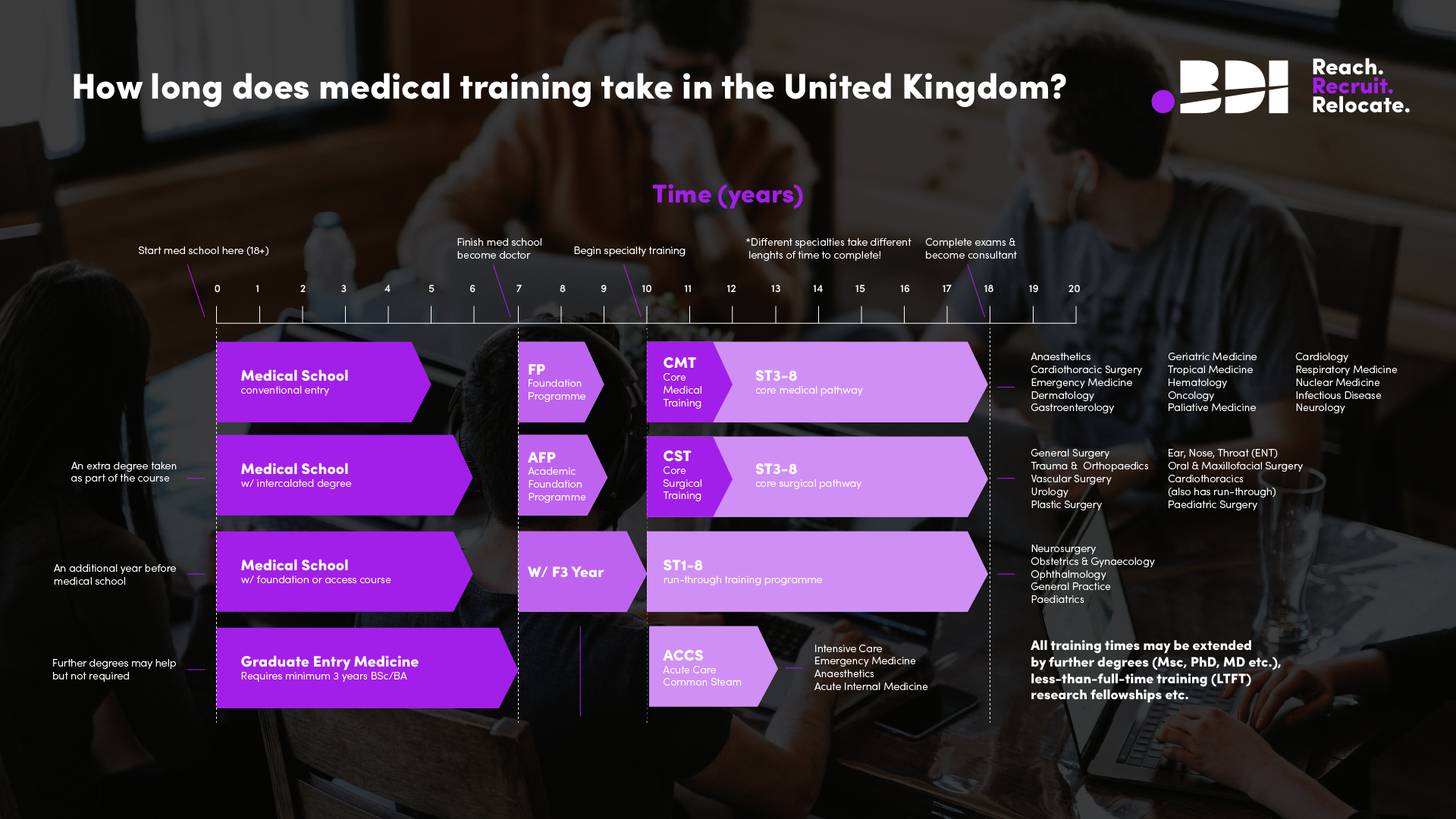NHS Doctors' Job Titles Explained
30 Aug, 20238 Minutes
As an IMG looking to move to the UK and work for the NHS, familiarising yourself with the various doctor job titles is important. Not only should you know the role you’ll be starting at after moving, but you should also know the role you’ll strive towards. Often, that will be a specialised consultant role.
In this article, we explain the most common doctor job titles in the NHS and explain their duties and responsibilities. Knowing the various titles of your colleagues will also help you understand their roles and responsibilities.
Medical Student
Before we get into the main titles, the starting point for all UK doctors is as a medical student. Time as a medical student will mostly be spent getting to grips with and understanding basic medical sciences before delving into clinical training. That will include five-year undergraduate study OR a four-year postgraduate course. Upon completion, medical students can work as resident doctors.
As an international medical graduate, you won’t need to go down the route of being an NHS medical student. As you have graduated overseas, you can use your experience and qualifications to begin as a resident doctor.
Resident Doctor
Formally "Junior" doctors prior to September 2024, resident doctors are fully qualified and either still in postgraduate training or gaining experience as locally employed doctors. They make up the largest single group om the UK's medical workforce. Given that many resident doctors have more than a decade of experience as qualified professionals, the BMA voted to remove the term "junior", branding it misleading and not representative of the doctors' expertise.
Resident doctors can work at various levels, including:
- FY1: Foundation Training Year 1
- FY2: Foundation Training Year 2
- ST1+: Speciality Training
- CT1+: Core Level Training
During this time, resident doctors often establish their speciality and gain valuable experience working in a hospital as a doctor. Their responsibilities include both ward duties and on-call duties. For example, they might perform tasks like reporting tests, writing up discharges, and covering parts of a ward. They’ll rotate between hospitals and departments to gain experience in a variety of NHS medical settings.
Speciality Training grades (ST1 and ST2) are focused on an individual specialism and run right through to CCT (for example in Radiology and Histopathology). Core Training (CT1 and CT2) is slightly different as you would focus on a broader range of areas. For example you might do four rotations in different Medicine or Surgery areas before applying to one single area for your ST3+ training which comes next. None training posts are also available at these levels and are sometimes called ‘Junior Clinical Fellow’ or ‘Trust Grade’ posts. The term 'SHO', although not widely used anymore, can describe doctors at the ST1/2 or CT1/2 level.
ST3+ (Middle Grade) Doctor
Once completing ST1 & 2 or CT1 & 2, resident doctors can carry on their training with ST3+ roles. These are often known as middle-grade doctors. At this stage, they have gained enough experience to start higher speciality training. They also take on a lot more responsibility in their chosen speciality. The level ranges from ST3 to ST8 depending on the chosen speciality.
For run-through specialisms like Radiology ST3 will be a continuation of the same training that started at ST1 level however for Surgical and Medical specialisms you’ll complete core training before moving in to an individual specialist field at ST3 level.
There are non-training posts equal to this level: Senior Clinical Fellow or Trust Grade ST3+ are a couple of examples. These non-training equivalent positions focus more on service and seeing patients over training, although it is very common for this level to include access to many of the same benefits of an ST3+ trainee, such as clinical and educational supervisors. They also provide an excellent springboard to complete the competencies required to join a specialist training programme.
Specialty Doctor
Speciality doctors are senior doctors who have completed four years of postgraduate training, with a minimum of two years of that being in their chosen speciality. Speciality doctors are equal to the ST3+ level, only it is a non-training post. Their responsibilities involve direct patient care, research, and professional development activities.
These roles suit UK and international doctors alike with many UK doctors who choose to take a break from training opting to use them during their time out. Some prefer the work/life balance that is sometimes associated with specialty doctor roles since the hours are usually more predictable with lower on-call and out of hours commitments. More senior IMG doctors often use these posts to gain some experience or whilst they pass their Royal College qualifications in order to get in to training posts which are highly competitive when applying directly from overseas.
Specialist Doctor
A specialist doctor is a new grade introduced in 2021 which takes on high levels of responsibility. They are very senior doctors who have specialised in a specific area, and they can use their expertise to work closely with patients, providing medical services for specialist treatments and acting as decision-makers. On top of that, specialist doctors also train, teach, and manage other doctors. In fact, it carries many of the same responsibilities and a similar starting salary as a consultant-level doctor. The main difference between a specialist doctor and a consultant is that specialists are not required to work at an independent practice level or be on the specialist register.
Becoming a specialist or speciality doctor when entering the UK is an increasingly popular choice for IMGs, as it’s a senior role with high pay without the independent practising required of a consultant. Many doctors choose to stay as specialist doctors throughout their careers, but there is also the route of CESR for becoming a consultant. Crucially the role was created to make room for those doctors who are too senior for Speciality Doctor or Specialist Training grades but, for whatever reason, cannot join the specialist register. This is particularly applicable to doctors working as Consultants overseas who haven’t yet completed CESR but still wish to act at an independent level.
Consultant
Consultants are the highest role of any hospital doctor. Having completed their full medical training and gained their CCT, they work as senior doctors in their specialised area. It takes between eight and ten years for doctors to become consultants after graduation.

Due to their high level and deep expertise, they deliver expert clinical care to patients. In addition, they are often responsible for leading a team within the hospital, ensuring that everyone comes together to deliver the best possible patient care. They work as part of a multi-disciplinary team, providing specialised clinical care while also referring patients to other departments and specialists if needed.
Most importantly, Consultants are highly responsible for their area of care. This means that you need to be fully independent if you wish to practice at this level. You’ll be asked to partake in audits, support development of more resident doctors and deal with the highest level referrals.
Consultant roles can be quite intense if you’re not used to the NHS so most IMGs don’t start as consultants when initially moving to the UK. The more usual route is to work as a Specialist or Specialty Doctor whilst pursing CESR or CESR-CP. That said, it is possible to work as a Consultant without specialist registration however you’ll be restricted to ‘locum consultant’ posts which mean you can only be appointed for a fixed term contract.
General Practitioner
The NHS has a vast network of primary care facilities, much of which are made up of GP practices. Every person in the country should be registered at a GP clinic and this will be the first point of medical contact for most non-emergency situations. This makes General Practitioners crucial to the NHS.
Instead of working in hospitals, most GPs work in smaller clinics throughout the UK, providing a general healthcare service to patients. General practitioners treat a wide range of common medical conditions in non-emergency situations. They also often work continuously with patients with acute and chronic illnesses. Some of the common services that GPs provide include:
- Diagnosing Conditions
- Treating Wounds
- Mental Health Advice
- Administering Vaccinations
- Prescribing Medications
- Referrals
Unlike many other roles on this list, general practitioners tend to work in local practices, with part of their responsibility being to refer patients to hospitals or a specialist when necessary.
Locum Doctor
The NHS employs multiple locum doctors. A locum doctor’s purpose is to cover another doctor’s shift to ensure that the role is always filled. That might happen when a doctor is on maternity leave, sick leave, or when there is simply a need for more doctors in the hospital or practice. In any of these situations, the GP surgery or the hospital can employ a locum doctor for the set amount of time that they are needed.
There are three options for Locum employment – working through a staffing agency, an internal staff bank or on a direct NHS contract.
- Staffing Agencies – Here you’ll be employed by the agency and work on an hourly basis. You’ll submit timesheets to your agency and usually get paid a premium rate since you’ll be called upon at short notice, often to work unsociable hours.
- Bank Shifts – Here you’ll be paid by an NHS Trust (or their bank staffing solution) and receive a marginally higher rate than normal hours. You’ll get slightly better opportunities as bank are given first refusal before shifts are vended to external agencies. It’s a bit like working overtime or covering your colleagues when they are off.
- NHS Locum Contract – There are a number of reasons that you might get offered a fixed term or locum contract rather than a permanent or substantive contract from the NHS. You’ll work as direct employee for a fixed amount of time and receive a salary. So these are slightly longer term but not permanent roles.
Locum doctors can be of any level above FY1. That means you can become a locum doctor as a resident doctor, specialist doctor, consultant, or GP. To find work, locum doctors often join a staffing agency alongside signing up to their local staff bank. They can then search for and apply to various locum roles around the UK. To access the best paying roles for the locum’s speciality this can mean a fair amount of travelling.
The responsibilities of a locum doctor are very broad due to the nature of the role; they take on the duties of whichever doctor they are replacing during that time.
Academic Doctor
An NHS clinical academic doctor takes part in teaching, research, and patient treatment. Their focus is on the development of medical science. There are many different levels of an academic doctor, ranging from academic clinical fellow to professor. The role differs depending on the type of academic doctor, too. Professors might focus mainly on teaching medical students, whereas a clinical research fellow will carry out assessments and clinical trials.
You should also check out this helpful explainer video which explains all grades from resident to consultant and everything in between:
How much do Doctors get paid?
You might wonder how much you can expect to get paid depending on your job title in the NHS. Many of the more senior positions provide higher pay. Here are the basic salaries from the Resident Doctors 2016 contract (these are basic salaries and don’t include enhancements which often add another 30% to total pay):
FY1: £36,616
FY2: £42,008
CT1-2: £49,909
CT3-4: £61,825
ST1-2: £49,909
ST3+: £61,825
ST6+: £70,425
As you can see, you will earn more as you develop. Once you reach a level like a consultant, you can expect to earn a lot more, with NHS consultants earning an average of £105,504 - £139,882 per year. You can read more about NHS pay scales for doctors here.
What are NHS Specialities?
When you work for the NHS, you have the option to develop a speciality, particularly when you move from FY2 into an ST1+ position or CT2 into an ST3+ position. Here are the branches of medicine you can choose to pursue:
Anaesthesia
Anaesthesia involves administering anaesthetics for a range of medical procedures, with the goal being to remove pain. Anaesthetists work in many hospital areas; some work in intensive care units, whereas others work in maternity wards to assist with pain-free childbirths.
Clinical Oncology
Clinical oncologists manage, monitor, and treat cancers, often using radiotherapy and chemotherapy. Many clinical oncologists will specialise in a type of cancer. On top of treating cancers, NHS clinical oncologists also have the opportunity to partake in research into specific cancers, helping to pioneer new treatments.
Clinical Radiology
Clinical radiology is a branch of medicine that focuses on imaging techniques. They work with patients suffering from various medical conditions, analysing those medical images to diagnose patients. Working in clinical radiology also offers a chance to specialise further in areas such as oncology, paediatric, breast, and neuroradiology.
Community Sexual and Reproductive Health
Doctors working in community sexual and reproductive health offer advice and treatments relating to sexual health. For example, they may provide assistance for STIs, unwanted pregnancies, and contraception difficulties.
Emergency Medicine
Emergency medicine involves caring for patients suffering from life-threatening, urgent medical conditions, from serious injuries to cardiac arrest. They usually work in the Accident and Emergency department of a hospital.
General Practice
A general practitioner (GP) usually works in a local clinic offering healthcare services for common ailments. As well as prescribing medication, performing physical exams, and advising patients, GPs also refer their patients to specialists.
Intensive Care Medicine
Intensive care involves providing clinical care to critically ill patients. These patients are the ones that need the most attention; often, they suffer from organ failure or dysfunction, such as sepsis or liver failure.
Medicine
Medicine in the NHS offers 29 specialities to choose from, including cardiology, elderly care, general medicine, acute internal medicine, renal medicine, stroke and neurology.
Obstetrics and Gynaecology
Obstetrics and gynaecologists work specifically with pregnant women all the way up until the birth of the child (and sometimes after). It can involve dealing with healthy, low-risk pregnancies, as well as higher-risk pregnancies that might end in complications.
Occupational Medicine
Occupational medicine handles diseases related to the workplace. It’s a very particular type of medicine, and occupational doctors understand environmental laws just as much as medical services. A common type of medical condition an occupational doctor may come across is respiratory issues – perhaps caused by exhaust fumes.
Ophthalmology
Doctors working in ophthalmology deal specifically with eye disorders, such as glaucoma, cataracts, and retinopathy. They often diagnose conditions as well as provide treatments, such as reconstructive surgery and cataract surgery.
Paediatrics
Working in paediatrics means explicitly working with children and young people up to the age of 18. It covers various medical services, from general checkups to emergency medicine.
Pathology
Pathology is a branch of medicine concerned with the science behind diseases and disorders, as well as investigating the best treatments. It combines medicine and science, with pathologists often partaking in research. The NHS has four main pathology specialisms to choose from haematology, histopathology, chemical pathology, and microbiology & virology.
Psychiatry
Psychiatrists provide healthcare to those with mental health issues, including depression, anxiety, schizophrenia, and dementia. The treatments mainly involve talking therapies. As such, psychiatrists need to be highly communicative and empathetic.
Public Health Doctor
Public health doctors do not deal with patients on an individual level. Instead, they look at the wider view of the general population's health. Many public health doctors don’t even work in medical environments – some work for local governments and universities.
Surgery
Surgery involves providing surgical treatments to patients, and surgeons can usually perform surgery on nearly all areas of the body. However, many surgeons specialise in a specific area, such as heart surgery or joint replacement. In the NHS, being a surgeon often comes with one of the highest salaries.
Which Path is Right for You?
When applying for an NHS role, you should have some idea about which job title you want to go for. Many IMGs who have completed an internship overseas can start at an ST1/CT1+ level role. For those with a postgraduate degree and speciality training experience, starting at a higher level like ST3+ or Speciality Doctor might be possible. If you’re plan is to pursue a training post then you might want to read up on career progression and grades for UK doctors.
In terms of speciality, that really is up to you. For example, you might have already pursued speciality training overseas and know exactly which speciality you will be doing in the NHS and can start at the ST3+ level. Or you might be fresh out of an internship and ready to try out different specialities during your time working in an NHS hospital in a non-training post.
In Summary
Knowing the various NHS job titles is good practice for you as an IMG. Even if you only end up working as a couple of these titles, you’ll still need to familiarise yourself with your colleagues! Also, remember that the more senior roles – such as general practitioner, consultant, and specialist doctor – require many years of training.
If you would like to know more about working in the NHS and keep up to date with all the latest job vacancies, then contact us and we’ll be happy to help.


